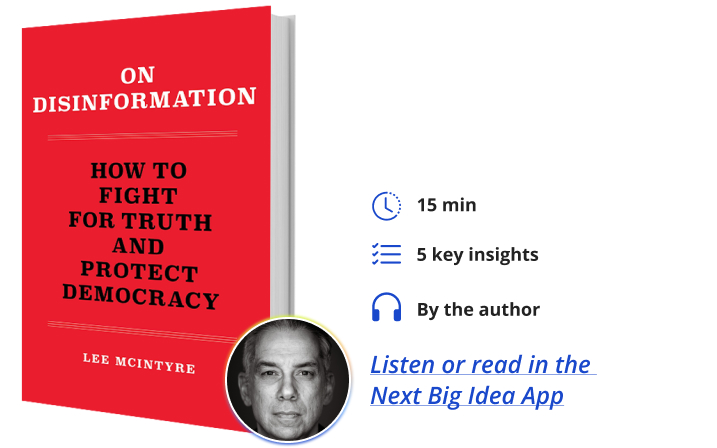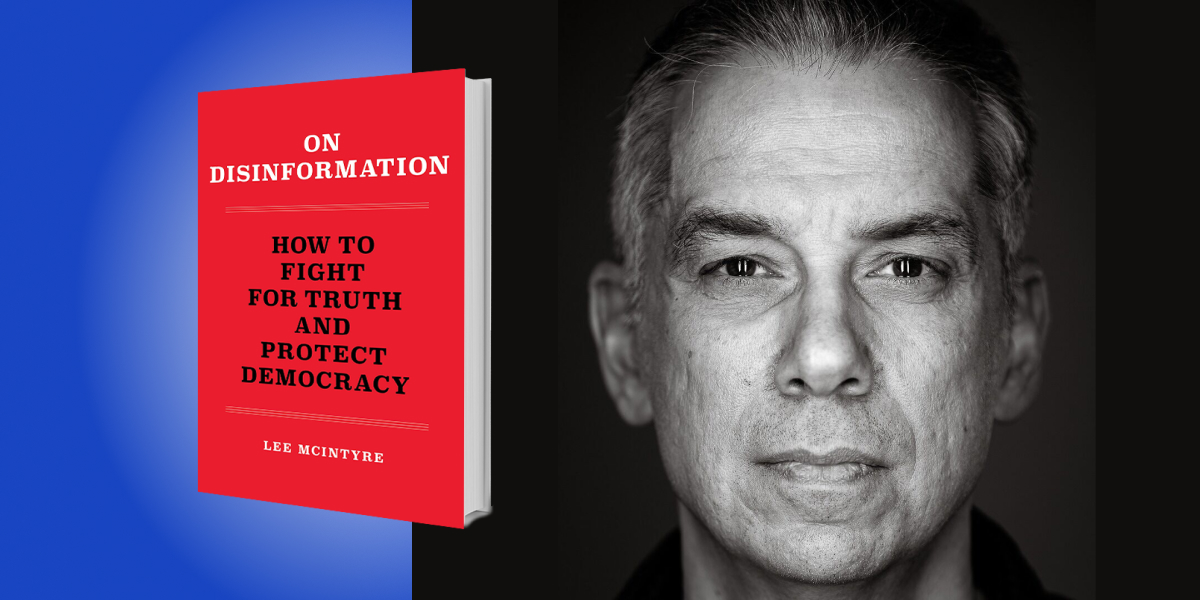Lee McIntyre is a research fellow at the Center for Philosophy and History of Science at Boston University and an Instructor in Ethics at Harvard Extension School. He also has a Ph.D. in Philosophy from the University of Michigan. He is well known for his most recent book How To Talk To A Science Denier.
Below, Lee shares five key insights from his new book, On Disinformation: How to Fight for Truth and Protect Democracy. Listen to the audio version—read by Lee himself—in the Next Big Idea App.

1. Misinformation and disinformation are not the same.
One of the biggest problems with the media, politicians, and most of the rest of us these days, is that we keep referring to “the fact and belief problem” we have in this country as one of misinformation rather than disinformation. However, the difference is crucial.
Misinformation is a mistake, when someone says something they genuinely believe to be true, but it turns out to be false. Disinformation is a lie, the intentional creation and sharing of a falsehood. On top of this, the person sharing it knows it to be untrue, but they do so anyway because it serves some particular goal or purpose that benefits them. Perhaps their goal might be economic, political, or ideological, it doesn’t really matter. The key difference is that misinformation is a mistake, whereas disinformation is created for the benefit of the person who creates it, not the person that believes it.
2. Disinformation is the primary cause of denialism.
Whether you’re talking about climate denial, vaccine denial, or Trump’s big lie about the 2020 presidential election, they all follow the same flawed playbook. The primary factor behind all of them is disinformation.
If somebody is going to go to the trouble of creating a strategic campaign of denial, it’s because they want something. For example, look at what happened in the 1950s when the tobacco companies were scared about a forthcoming study that demonstrated a link between cigarette smoking and lung cancer. Big Tobacco fought this study by hiring a public relations consultant who advised them to “fight the science.” They took out full-page ads in American newspapers and created a fake scientific organization called the American Tobacco Institute. They leaned on journalists and editors to do more to tell the “other side of the story” about tobacco, even though there really wasn’t one.
“Disinformation isn’t used just to deny the truth about science, but also reality in general.”
But it worked. Within two years there was significant public doubt about the scientific consensus linking smoking and cancer. This paved the way for the next sixty years of science denial on topics like acid rain, the ozone hole, and global warming.
This same strategy was later used by the Russian Foreign Intelligence Service during the Covid-19 pandemic when they suggested that Western vaccines might contain tracking microchips. They published a false story in one of their English language propaganda arms in April 2020, and by May 2020 it had worked; CBS News reported that 28 percent of the American public believed this bogus lie. Why did the Russians do it? The same old motives: money and power. They hoped to undermine the Western vaccines before they were even invented so their Sputnik vaccine could dominate the world market. Whether foreign or domestic, all disinformation works this same way: it’s invented to push people to believe something that they otherwise probably wouldn’t, and to cloak the fact that it is disinformation. Disinformation isn’t used just to deny the truth about science, but also reality in general.
3. The success of science denial paved the way for today’s reality denial.
These kinds of denialist campaigns were so successful that they caught the eye of politicians, who sought not simply to deny a few inconvenient facts about science, but even larger truths about reality in general. Did you ever wonder why Donald Trump lied about how his inauguration crowd was bigger than Obama’s? It’s because he was preparing everyone for the “post-truth” environment that was about to come. Trump wasn’t lying merely to convince us but to assert his power. “Post-truth,” is the political subordination of reality, when you want something so big that you need to bend reality to your will. To do this, you’re going to use disinformation.
We’ve already seen how disinformation is a lie that is created to get people to believe a falsehood, but for an autocrat, that’s not enough. They don’t just want people to doubt some particular truth, but to become so polarized around factual issues that they see anyone with the opposite opinion as their enemy. They perhaps might even hate them, or think that they deserve to be punished. At that point, it isn’t about just one lie, it’s about creating an army of deniers who are prepared to believe whatever you tell them, and that is the road to authoritarianism. The primary example of this is Trump’s big lie about the 2020 presidential election, and how he used it to foment the insurrection on January 6th, 2021. However, we can also see this going on right now in electoral dictatorships like Russia and China, and democracies like Hungary and Turkey.
4. We can fight back against the threat from disinformation, but we have to have a plan.
The most important step in fighting disinformation is to recognize the pipeline that goes from the creators to the amplifiers and then to the believers. The pinch point here is amplification.
Politicians and others have always lied to try to achieve their goals, but today it is different; the Internet is a disinformer’s dream. In 2019, the Center for Countering Digital Hate found that 65 percent of anti-vax propaganda on Twitter was due to twelve people, of which eight still have a platform there. Could social media companies do more to fight disinformation? Yes. But what is their incentive? Could government officials do more to pass appropriate regulations to change these incentives? Yes, but first they would have to acknowledge that there is a problem.
“We are in more of a war than a hurricane, which means that there is something we can do to fight it.”
There’s a concerted effort by many Republicans in Congress to advance the bogus idea that fighting disinformation is tantamount to censorship. Since when does your refusal to amplify someone else’s lie infringe on their free speech?
Here the media bears some responsibility. Remember the problem of confusing misinformation with disinformation? Well, here’s why that really matters. The media’s continual use of the term misinformation makes it sound like what we’re all living through today is a natural disaster, something that keeps us glued to our TV sets even while it makes us feel helpless. It also fulfills another primary goal of the media: to avoid accusations of political bias. By refusing to name names, they’re saying that this really isn’t anybody’s fault, even though it is. If we use the term disinformation, then that means it’s a lie, it means that there must be liars. If there are liars, then we are in more of a war than a hurricane, which means that there is something we can do to fight it.
5. There is something that each of us can do to protect truth and democracy.
There are ten practical steps that we, the voters and the people of the world, can take to push back against the threat that disinformation poses to science, democracy, and a host of other things we care about. Disinformation can be fought, but first, we must be awake to its threat and willing to do something about it.
If you do not like how your cable news channel is covering the problem of disinformation then complain to them and their advertisers. If you think that your Member of Congress isn’t doing enough to push back against the big tech companies, threaten to vote them out of office. If you are angry at social media companies like Facebook and Twitter because they aren’t doing enough to fight this problem, organize and boycott their platform and advertisers.
On top of this, spread the word at the grassroots level to your family and friends about the seriousness of this issue. If we continue to ignore this problem, it could lead to the downfall of our democracy. We need to take action. However, to win an information war, first, we must be willing to admit that we are at war.
To listen to the audio version read by author Lee McIntyre, download the Next Big Idea App today:
































